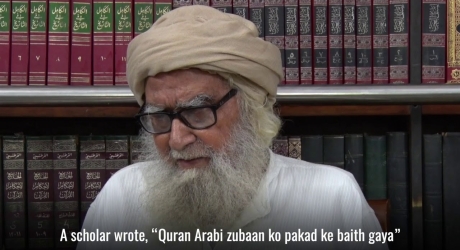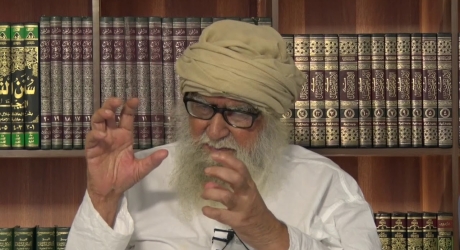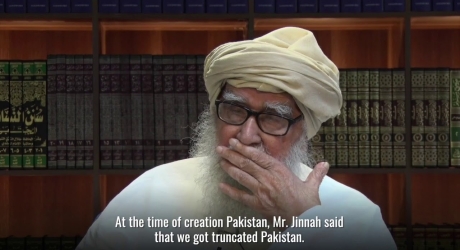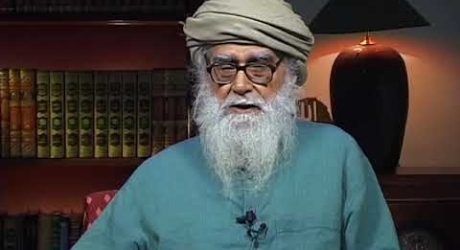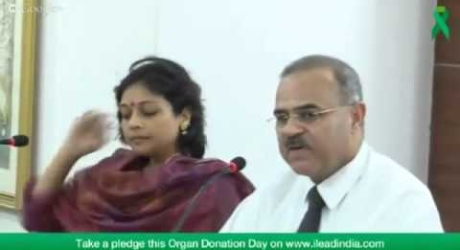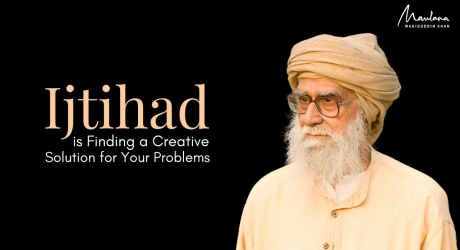Muslims of the present day generally see themselves as the victims of plots and targets of their “enemies” violence. The Quran rejects this theory, saying, ‘And never will God allow non-believers to harm the believers.’ (4:141). Then what is the reason for the Muslims’ present plight? In another verse, the Quran, in response to this question, says: ‘Whatever misfortune befalls you is of your own doing.’ (42:30) The question arises as to the real cause of the problems facing Muslims today. It is the answer given by the Quran: ‘O Prophet, deliver what has been sent down to you by your Lord. You will not have conveyed His message if you do not do so. God will protect you from the people.’ (5:67) This verse of the Quran makes it clear that the issue of the protection of believers is linked to dawah work. If the Muslims perform their dawah duties, they will remain under God’s protection. Whereas, if they neglect dawah work, this divine protection will be taken away. The solution to the problem of Muslims cannot be found either in protests or in confrontation. The only solution to their problem rests in dawah work. No other strategy can be of any avail to the Muslims in this matter: only dawah work guarantees divine protection for the Muslim Ummah.
Introduction
The observance of December 6, as a “Black Day” is an entirely un-Islamic behaviour. This day should have become the “Day of introspection (Muhasabah)”, in keeping with the tradition of the Prophet Muhammad and his Companions, who never complained, befell what may. They always resorted to introspection to find their own shortcomings so that these could be rectified.
Importance of Introspection (Muhasabah)
Emphasising the need to introspect and inculcate a blame-thyself attitude, the Quran observes,
“In order that He might put you to test, He prevented you from defeating your foes.”(3:152)
This verse was revealed during the
“On the day of Hunayn, when you took pride in your great numbers,
they proved of no avail to you.” (9:25)
On both the occasions, believers were asked to introspect so that they could understand the limitations due to which the loss occurred. The irony is that on one hand, Muslims say that Islam is a complete system of life, but when faced with situations, they neither introspect nor search for solutions in the Quran or the Hadith; rather, they react.
Be it the case of
“If God did not repel the aggression of some people by means of others, cloisters and churches and synagogues and mosques, wherein the name of god is much invoked,
would surely be destroyed.” (22: 40)
The above verse clearly alludes to the fact that God defends the believers. Another verse says,
“The Arabs of the desert say, ‘We have believed.’ Say to them, ‘You have not believed yet; say rather, “We have submitted,” for faith has not yet entered into your hearts.” (49:14)
In the light of these two verses, the question that arises is that if God defends the real believers, how could the Babri Mosque be demolished? Why did God not help on this occasion?
While God vowed to provide divine succour to the believers, the imaan (faith) of present-day Muslims is merely lip service. They do not follow the teachings of Islam in its true spirit. Their actions are not based on the teachings of the Quran and the Hadith but are done out of reaction. Let me elucidate this by taking the case of the Babri Mosque.
How did Muslims overlook Islamic teachings in the case of the Babri Mosque?
In 1528, at the time when Babar ruled Awadh, there existed no mosque in Ayodhya. Mir Baqi, the governor of Babar was the disciple of a Sufi, famous, both among the Hindus and the Muslims. Mir asked his mentor about constructing a mosque at Ayodhya. The Sufi, naively, advised Mir to go ahead thinking that it would serve as a point of confluence for the Hindus and the Muslims.
In my younger days, I used to often hear that there is a mosque in Ayodhya which has a temple within it. So I visited the mosque myself. While I could see no temple inside the mosque, at a distance was an elevated ground where some utensils were kept. This place was called the Ram Chabutra and it was believed that the Hindu deity Rama lived there. The biggest mistake committed by Mir Baqi was that he connected this chabutra to the mosque. This was entirely against the teachings of Islam. The Sufi who had advised Mir Baqi was not a scholar on Islam and could therefore not refer to the example set by Caliph Omar in the early Islamic history, where he disallowed such an act anticipating the potential conflict it could create in future.
During 636 A.D., the patriarch of
As they neared their destination, it was the chance of the slave to sit on the camel. The slave implored that the Caliph must mount the camel as they were entering the city, but Caliph Omar refused and asked him to stay on the camel. The patriarch and people of
While in the
There lay great wisdom in not praying at the Church. Had Caliph Omar performed his prayer at the Church, the Muslims would have wanted to build a mosque in its place. This was a well-considered response but Mir Baqi failed to derive any lesson from this precedent, which already existed in the history of Islam.
Arousing the conflict
At the time when the mosque was built, there was no conflict between the Hindus and Muslims. This can also be inferred from the following poem of Tulsidas (d. 1623) where he says, “I ask for food to eat and a place to sleep in the mosque.” The mosque referred to in the poem is the Babri Mosque.
The dispute regarding the mosque first arose during the pre- independence days but it was subdued by Nawab Wajid Ali Shah. In 1949, the conflict arose again after three idols were placed inside the Babri Mosque. This gave way to the second phase of the Babri Mosque issue.
According to a Hadith,
“Fitna is sleeping. He who arouses it is condemned.” (Kanzal Ummal)
Choosing to awaken a fitna is a hard option and as is evident from the life history of the Prophet Muhammad, he always opted for the easier option (Al-Bukhari). But Muslims failed to take any lesson from the teachings of the Prophet. Instead of remaining peaceful, Muslims chose to react. Adopting the course of violent action and provocative speeches, Muslims leaders awakened the fitna. Amidst the chaos that prevailed during those days, an unknown Muslim resident of Ayodhya, had taken the correct step and filed a suit in the court of law. This was a justified course as he was seeking legal remedy for the issue.
General Ziaul Haq famously said, “Demonstrations generate more heat than light.” The demonstrations organized by the Muslims were a product of reaction. The acrimonious exchange of emotions only augmented the fitna further. The resultant hatred was so severe that it led to the killing of thousands of people in the riots that broke out following the demolition of the Babri Mosque.
The other mistake
In order to prevent any such incident to take place in the future, the then Prime Minister Mr. P.V. Narsimha Rao tabled the Places of Worship bill. According to this Bill, all the places of worship were to be maintained at their 1947 status, except the Babri Mosque. This exception was made because the issue of the Babri Mosque was sub-judice in the court of law and government could not propose an act for a pending litigation. The act was an opportunity for Muslims to be quiet in the case of one mosque and for the Hindus to be quiet in the case of the remaining mosques in the country. This is the formula that I had prescribed at the time of the demolition of the Babri Mosque. At that time, the Muslims did not accept this formula, but now, practically all Muslims are following this formula and have become quiet.
According to a verse in the Quran,
“Re-conciliation is best.” (4:128)
The then Chief Minister of Uttar Pradesh had offered to relocate the Babri Mosque. Immersed in pride, the Muslims refused this offer. They were not ready to compromise, despite the Quranic exhortation to avoid confrontation. The Babri mosque could have well been relocated just like several mosques in
In fact, the Chief Minister of Uttar Pradesh had gone a step ahead and said, “If the Muslims are ready for relocation of the Babri Mosque, I’ll carry the stone of its construction on my head and will provide a bigger place for its construction.” But the Muslims lost this opportunity due to their impulsive nature.
Conclusion
Muslims consider Islam to be a complete religion but do not practically follow it. In every situation, the actions of Muslims are found to be against the teachings of the Quran and Hadith. They do not realize that calling Islam a complete religion is not a matter of pride but demands great sacrifice. If followed in the right spirit, it would inculcate in them a sense of merciless introspection and not vanity.
Muslims say that the demolition of the Babri Mosque was a case of affliction. This is an incorrect interpretation of an event which in reality was a test. According to a verse in the Quran, different situations in life are meant for testing man,
“So that you may not grieve for what has escaped you,
nor be exultant over what you have gained.” (57: 23)
In showcasing their impulsive attitude, Muslims failed the test that was instituted for them by God. Some made an overt display of their negativity while others carried negative emotions passively. Both proved themselves to be equally unworthy of the blessings of God.
The time for repentance is now. An article published in the Crest edition of The Times of India was entitled, “Two degrees away from Doomsday.” We must do merciless introspection and pouring all our energies into spreading the Word of God, seek forgiveness earnestly so that we may become contenders for a better world in the hereafter!
May God forgive us and guide us to the right path!





